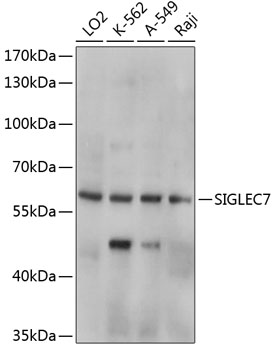-
Product Name
SIGLEC7 Polyclonal Antibody
- Documents
-
Description
Polyclonal antibody to SIGLEC7
-
Tested applications
WB, IHC
-
Species reactivity
Human
-
Alternative names
SIGLEC7 antibody; AIRM1 antibody; CD328 antibody; CDw328 antibody; D-siglec antibody; QA79 antibody; SIGLEC-7 antibody; SIGLEC19P antibody; SIGLECP2 antibody; p75 antibody; p75/AIRM1 antibody; sialic acid-binding Ig-like lectin 7 antibody
-
Isotype
Rabbit IgG
-
Preparation
Antigen: A synthetic peptide of human SIGLEC7
-
Clonality
Polyclonal
-
Formulation
PBS with 0.02% sodium azide, pH7.3.
-
Storage instructions
Store at 4℃. Avoid freeze / thaw cycles.
-
Applications
WB 1:500 - 1:2000
IHC 1:50 - 1:100 -
Validations

Western blot - SIGLEC7 Polyclonal Antibody
Western blot analysis of extracts of various cell lines, using SIGLEC7 antibody at 1:1000 dilution.Secondary antibody: HRP Goat Anti-Rabbit IgG (H+L) at 1:10000 dilution.Lysates/proteins: 25ug per lane.Blocking buffer: 3% nonfat dry milk in TBST.Detection: ECL Basic Kit .Exposure time: 30s.
-
Background
Putative adhesion molecule that mediates sialic-acid dependent binding to cells. Preferentially binds to alpha-2,3- and alpha-2,6-linked sialic acid. Also binds disialogangliosides (disialogalactosyl globoside, disialyl lactotetraosylceramide and disialyl GalNAc lactotetraoslylceramide). The sialic acid recognition site may be masked by cis interactions with sialic acids on the same cell surface. In the immune response, may act as an inhibitory receptor upon ligand induced tyrosine phosphorylation by recruiting cytoplasmic phosphatase(s) via their SH2 domain(s) that block signal transduction through dephosphorylation of signaling molecules. Mediates inhibition of natural killer cells cytotoxicity. May play a role in hemopoiesis. Inhibits differentiation of CD34+ cell precursors towards myelomonocytic cell lineage and proliferation of leukemic myeloid cells (in vitro).
Related Products / Services
Please note: All products are "FOR RESEARCH USE ONLY AND ARE NOT INTENDED FOR DIAGNOSTIC OR THERAPEUTIC USE"
